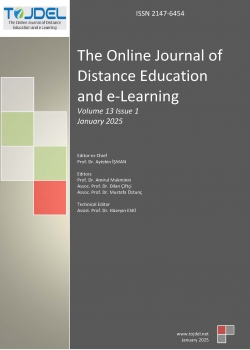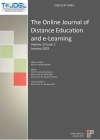TOJDEL - Volume 13 - Issue 1 - January 2025
 EFFECT OF ADMINISTRATOR’S ONLINE FEEDBACK ON JOB SATISFACTION AND TEACHING COMPETENCY OF SECONDARY SCHOOL TEACHERSUCATIONAL EQUALITY: DISTANCE LEARNING'S CONTRIBUTION TO ACCESSIBLE EDUCATION IN INDIA
EFFECT OF ADMINISTRATOR’S ONLINE FEEDBACK ON JOB SATISFACTION AND TEACHING COMPETENCY OF SECONDARY SCHOOL TEACHERSUCATIONAL EQUALITY: DISTANCE LEARNING'S CONTRIBUTION TO ACCESSIBLE EDUCATION IN INDIA Nilesh Kumar Patel
Abstract:
The present study is quasi experimental in nature. Main purpose of the study is to see the effect of Administrator’s online feedback on Job satisfaction and Teaching competency of Secondary school teachers during the Lockdown. The non-equivalent control group design was used for the present study suggested by Stanley and Campbell (1963). A total of 163 (61 Male, 102 Female) secondary level schoolteachers and principals of four schools are selected in this study. Two schools were randomly taken as treatment group and rest two schools were treated as control group. There were 78 teachers in experimental group and 85 teachers in control group. Standardized Job satisfaction questionnaire developed by Kumar & Mutha and Standardized General Teaching competency scale developed by Passi & Lalitha were used to collect the data. 2X2X2 two-way Analysis of covariance and Pearson’s Product moment correlation were used to test the null hypotheses of the study. Treatment was found significant and positive on Job satisfaction and Teaching competency. Female teachers were found to have significantly higher Job satisfaction as compared to Male teachers. Job satisfaction and Teaching competency were found independent of Gender and Salary of teachers. No significant interactional effect of Gender and Salary with each other and with the treatment on Job satisfaction or Teaching competency was seen. Suggestions for the administrators, teachers and educational planners are given in the study.
 GAMIFICATION IN EDUCATION THROUGH STEALTH ASSESSMENTS
GAMIFICATION IN EDUCATION THROUGH STEALTH ASSESSMENTS Y. Vijaya Lakshmi, Ishfaq Majid
Abstract:
Games play a very important role in promoting incidental learning and help in exploring both the conscious and subconscious processes such as insight of a learner. Digital Game-Based Learning and assessments are now an integral part of educational practices. When designed effectively digital games can take the learners from the stage of improvisation to a meta-reflection where they can apply the gained competencies/skills to real life situations. Increasing penetration of ICT into education and the disruptive educational technologies are making it possible not only to innovate but also to implement more and more exemplar teaching-learning pedagogies and assessment tools. Such innovations will shift the teaching-learning process from a rote learning process to an inclusive and individualized/personalized process. When developed properly, digital games can assess both procedural knowledge and declarative knowledge of the learners. One such technique of using digital games for assessment is stealth assessment (SA). They help in helps in assessing higher order thinking skills of students accurately and efficiently. SA adopts the approach of competency-based learning, where on the basis of performance of learners in the game their competencies are easily identified and are provided further tasks accordingly. The paper also discusses the challenges in development and implementation of SAs.
 LEARNING DIFFICULTIES AND REMEDIAL TEACHING IN MATHEMATICS: INSIGHTS AND INTERVENTIONS FOR EDUCATORS
LEARNING DIFFICULTIES AND REMEDIAL TEACHING IN MATHEMATICS: INSIGHTS AND INTERVENTIONS FOR EDUCATORS Kevinson Jyrwa, Sherwin May
Abstract:
The paper " Learning Difficulties and Remedial Teaching in Mathematics: Insights and Interventions for Educators " provides a comprehensive overview of the challenges faced by students with learning difficulties, particularly in the realm of mathematics. This paper emphasizes the importance of understanding the nature of these difficulties, which can range from basic numeracy issues to complex mathematical concepts. It discusses various manifestations of learning difficulties, including problems with mathematical operations, word problems, spatial awareness, memory issues, and math anxiety. The paper advocates for remedial teaching as a crucial intervention strategy, detailing effective teaching methods such as error analysis, concrete-to-abstract learning, differentiated instruction, and the use of technology. By fostering a supportive learning environment and encouraging a growth mindset, educators can help students overcome their challenges and develop a positive relationship with mathematics, ultimately enhancing their academic success.
 PERSPECTIVES ON HIGH-IMPACT PRACTICES FOR AN EXCITING EDUCATIONAL EXPERIENCE
PERSPECTIVES ON HIGH-IMPACT PRACTICES FOR AN EXCITING EDUCATIONAL EXPERIENCE B.H.S. Thimmappa
Abstract:
The collective future of humanity depends on focusing on the meaningful pursuit of new knowledge created from higher-order thinking skills learned from high-impact teaching strategies (HITS) adapted by the best teachers. Engaging the learners in the learning process through innovative teaching-learning methodologies, reinforcing the core concepts via active learning, and adapting tools, techniques, and ideas to comprehend domain-specific knowledge makes the classes more interesting and productive, and makes a paradigm shift in the teaching-learning process. This paper emphasizes the importance of implementing alternate HITS in higher education across multiple disciplines while conducting interactive sessions to have a substantially higher effect on student results. It will boil down to a direct interaction of the learner with the subject to largely improve upon the student’s performance.
 SOCIAL-MEDIA ON VOTING BEHAVIOR WITH SPECIAL REFERENCE OF BURHANPUR DISTRICT: A CASE STUDY
SOCIAL-MEDIA ON VOTING BEHAVIOR WITH SPECIAL REFERENCE OF BURHANPUR DISTRICT: A CASE STUDY Kavita Kakde, Usha Pandey, Lalit Tayde
Abstract:
Social-media is a 21st-century platform and instrument that enables nations and civilizations to produce, express, and extensively communicate their views and ideas. Individuals of all ages are interested in using and modifying this technology to connect to the globe in less time and energy. Social media skill is extensive enough to encompass blogging, picture-sharing, wall posting, music-sharing, troop sourcing and speech over IP, e-diaries etc, which currently people are loving to exploit it to connect with each extra and also excite themselves to innovate more thoughts and expressions. Social media is quickly becoming a popular tool for political parties to use during elections to influence, connect, and convey their ideas, with the goal of increasing their exposure or gaining a majority. People nowadays live on social media, and political parties seek to reach out to them there. The goal of this study paper is to better understand the influence social media plays in people' voting decisions. The study's findings indicate that social media has a considerable effect on voting decisions, particularly among young voters. The study also supports the notion that political leaders' remarks/tweets/comments have a substantial effect on their choice to election for that party.
 STUDENT ACCEPTANCE ON ELEARNING SYSTEM USAGE DURING AND POST COVID-19 IN TANZANIA: A CASE OF UDOM ECLASSROOM OF THE UNIVERSITY OF DODOMA
STUDENT ACCEPTANCE ON ELEARNING SYSTEM USAGE DURING AND POST COVID-19 IN TANZANIA: A CASE OF UDOM ECLASSROOM OF THE UNIVERSITY OF DODOMA Mustafa Habibu Mohsin, Hamadi Mtani, Florence Rashidi
Abstract:
The present study aimed to identify factors influencing students' acceptance of the UDOM eClassroom system at the University of Dodoma. The paper covers the pandemic situation during and after the COVID-19 impacts in Tanzania. The research model used the Technological Acceptance Model (TAM) as the theoretical framework and extends it by adding construct such as Management support, Facilitating conditions and Subjective norms from the other models. The model was tested using responses from 101 students (n=101) taking diplomas and bachelor's degrees from various programs at the College of Informatics and Virtual Education (CIVE) through survey data. After the quantitative analysis, the results revealed that perceived usefulness, ease of use, management support, facilitating condition, student attitude and subjective norm significantly influence the students' UDOM eClassroom acceptance. The study's findings will support educational institutions in identifying the strategies needed to boost learning platform usage and produce the intended outcomes.
 THE EFFECT OF SOCIAL MEDIA ON COMMUNICATION BARRIERS IN HIGHER EDUCATION (CASE STUDY CYPRUS INTERNATIONAL UNIVERSITY CIU)
THE EFFECT OF SOCIAL MEDIA ON COMMUNICATION BARRIERS IN HIGHER EDUCATION (CASE STUDY CYPRUS INTERNATIONAL UNIVERSITY CIU) Aytekin Ä°Ĺźman, Saeideh Shakibi
Abstract:
Social media has transformed higher education communication between students, professors, and institutions. As this study shows, social media enhances and alleviates communication challenges in higher education. This study examines effect of social media on communication barriers in higher education. The study employed quantitative approach. Data was drawn from 136 academic faculty, administrators, and students in higher education institutions. Descriptive and correlation analysis was conducted. The result shows that frequency of using social media for academic purposes correlated positively with privacy and security, information overload and language interpretation issues. Technical issue was observed to have an insignificant correlation with frequency of social media for academic purposes. It's crucial to consider the complex interplay of factors that lead to challenges
across various contexts, including professional and educational settings. Institution should stive to Achieve effective communication modalities within educational environments which requires not just an awareness of the diverse obstacles but also a commitment to developing strategies that promote clear, inclusive, and empathetic interactions.
 THE USE OF MOBILE DEVICES IN ENGLISH LANGUAGE LEARNING AMONG ADVANCED LEARNERS: INSIGHTS FROM INTERVIEW DATA
THE USE OF MOBILE DEVICES IN ENGLISH LANGUAGE LEARNING AMONG ADVANCED LEARNERS: INSIGHTS FROM INTERVIEW DATA A. BABU FRANKLIN, Sri Kaliswari College
Abstract:
This paper explores the role of mobile devices in facilitating English language learning among advanced learners. Based on interview data, it investigates learners' perceptions, usage patterns, benefits, and challenges associated with mobile-assisted language learning (MALL). The findings indicate that mobile devices offer personalized, flexible learning experiences but also highlight concerns about distraction and information overload. The data for this study were gathered from 20 students using a semi-structured interview format. Both qualitative and quantitative analyses were applied to the collected data. Findings from the study indicated that some participants showed an increased awareness of the beneficial role mobile devices play in their language learning. They demonstrated the capability to access appropriate tools and retrieve information to meet their objectives, fulfill their needs, and tailor their English learning to suit their individual learning styles. However, their use of mobile devices in the classroom was often spontaneous and unstructured.


